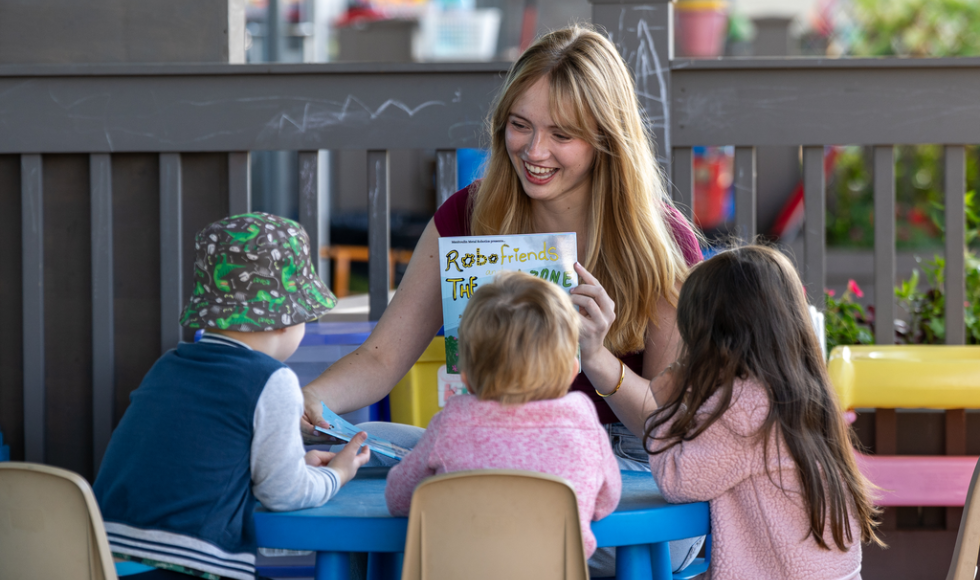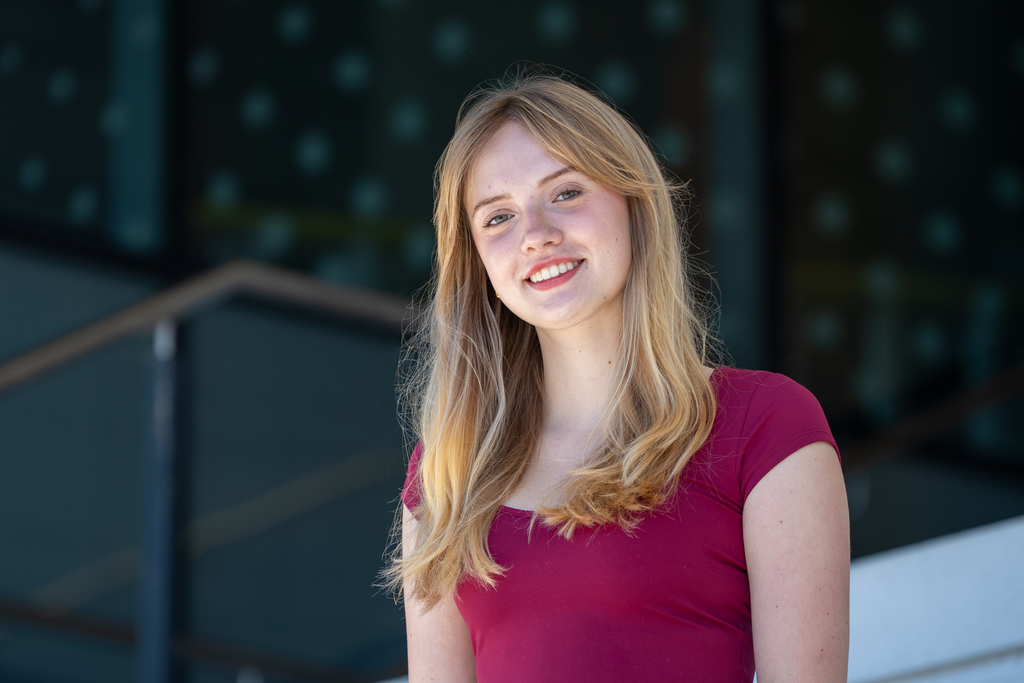Author and STEM advocate joins Wilson College inaugural class

Alexandra Wilson-Zegil reads one of her books at the McMaster Children's Centre. Wilson Zegil has written two children's books about robotics, aimed at helping children build literacy skills around STEM. (Photo by Georgia Kirkos)
Alexandra Wilson-Zegil was drawn to Wilson College’s Leadership & Civic Studies (WCLCS) program because she wants to make a difference. With two children’s books and years of community outreach programs under her belt, you could argue that the difference she’s made already is pretty tangible.
Wilson-Zegil grew up on Manitoulin Island, the largest freshwater island in the world. In the last few years, she’s worked as a freelance columnist for the local paper, led outreach events to get kids and seniors involved in STEM, and published a children’s book about robots.
She starts at McMaster this fall, as part of the inaugural class in Wilson College’s new Leadership & Civic Studies program.
The program is the first of its kind in Canada, with students earning a joint BA in Leadership and Civic Studies and in a program offered by the Faculty of Humanities or the Faculty of Social Sciences.
The Wilson College program emphasizes collaboration between McMaster’s academic community and local, regional and national leaders; students engage with real-life issues through experiential learning, community action and interdisciplinary research.
It’s the perfect fit for a curious, change-driven student like Wilson-Zegil. “I have a pretty strong interest in being an advocate and helping others,” she said. “This program, along with giving me an education in Political Science, which is what I’m interested in, will also help me learn how to best serve different communities, and be an adaptable asset to those communities.”
Robots and the island
Wilson-Zegil’s first exposure to STEM came from an advertisement for her high school robotics team when she was in Grade 9.
She didn’t have any previous experience, but over the next four years, she developed her technical skills and discovered that she could build up her other skills through robotics, too. For example, learning to code goes beyond getting a robot to move – it also teaches problem solving, and how to take a more formulaic approach that could be applied to different types of issues.
“What I’ve learned through my time on robotics is that there is a place for people in social sciences and humanities in STEM,” Wilson-Zegil said. “It’s actually very crucial that both have each other, and it’s kind of a symbiotic relationship between the two.”
She decided she wanted to help other kids to get involved in STEM fields, too, noting that since she’s from a rural area, it can be hard to be exposed to these fields. “We don’t have, for example, engineering firms… on the island.”
She started organizing outreach events for youth, introducing them to robotics through workshops and art stations.
During elementary school visits, she started hearing from teachers that there was a need for literacy tools around STEM. “A teacher was like, ‘Well, they love their robots, but they need literacy skills to even understand what’s happening,’” Wilson-Zegil said.
So she wrote a children’s book, Robofriends and the Mow Zone, illustrated by her friend Robyn-Ashley McNaughton. They published it in 2023 and have sold 500 copies so far, with many now in elementary schools and libraries.
The book has helped her connect even more with kids in the community, whether through book readings at elementary schools, or speaking at professional development events for educators. Wilson-Zegil and McNaughton teamed up for a second book, Robofriends and the Beach Day, published this summer.
Wilson-Zegil was also named a student trustee of the Rainbow District School Board (RDSB) for the 2024-2025 school year. As a personal project, she worked with local elementary schools to create lesson plans that featured women in STEM.
“These lesson plans aligned with teaching required material,” Wilson-Zegil said. “They also taught girls that there are people in these fields that are like them, and that they can also pursue that.”
She also delivered tech workshops for seniors, to help them get connected to their phones and develop cellphone skills. “A lot of them, they live far out of town, so it’s also kind of a safety thing, being able to contact family,” Wilson-Zegil said.
In recognition of the impact of all these programs on her community, Wilson-Zegil was named as one of 20 recipients of the TD Scholarship for Community Leadership. The scholarship provides up to $70,000 over four years for post-secondary education.
Choosing Mac
Wilson-Zegil looked at programs across the country when she was deciding where to pursue her education. She chose Wilson College’s Leadership & Civic Studies in part because of the interdisciplinary nature of the program.

She’s interested in political science, and wants to remain involved in STEM. “I really want to be in a position where I am helping people, and looking out for others when big decisions are being made,” she said. “With Wilson College, I will be studying social sciences, but then it’ll help me better integrate myself into the leadership of STEM fields.”
It’s a big leap, going from an island – where they only have one stoplight – to Hamilton. She joked that she has no street skills: “I don’t know how to use the bus. So I need to figure that out.”
“The island has provided me with a lot of unique experiences… the community’s very tight– knit. It’s very supportive,” she said. But she’s very excited to get “out into the world… I am really excited to meet new people, from all different walks of life.”
The program has a targeted enrolment of 40 students, and Wilson-Zegil has already connected with many of her classmates, through online group chats and Wilson-led events like a BBQ in mid-July. The class of 2029 has started discussing traditions they want to start for the college – ranging from fun activities, like water balloon battleship, to events to help out the Hamilton community.
And Wilson College has already been cultivating a supportive environment, with academic advising and orientation events. They even put a copy of her book in their new student lounge.
“I feel so welcomed,” she said. “This is where I belong, and I’m really excited to help grow and develop this community.”
It’s especially exciting to be part of the inaugural class at Wilson College, she said.
“You don’t really know what’s ahead, because no one else has really walked down this path before,” Wilson-Zegil said. “You’re the first person, but that also means I get to help out the people behind me.”
There is no relation between Alexandra Wilson-Zegil and L.R. “Red” Wilson, namesake of Wilson College. Wilson, an accomplished Canadian business and public service leader and philanthropist, has been an extraordinary champion of McMaster University for six decades. His $50 million gift to create the Wilson College of Leadership and Civic Engagement is the single biggest gift to the liberal arts in Canada.


